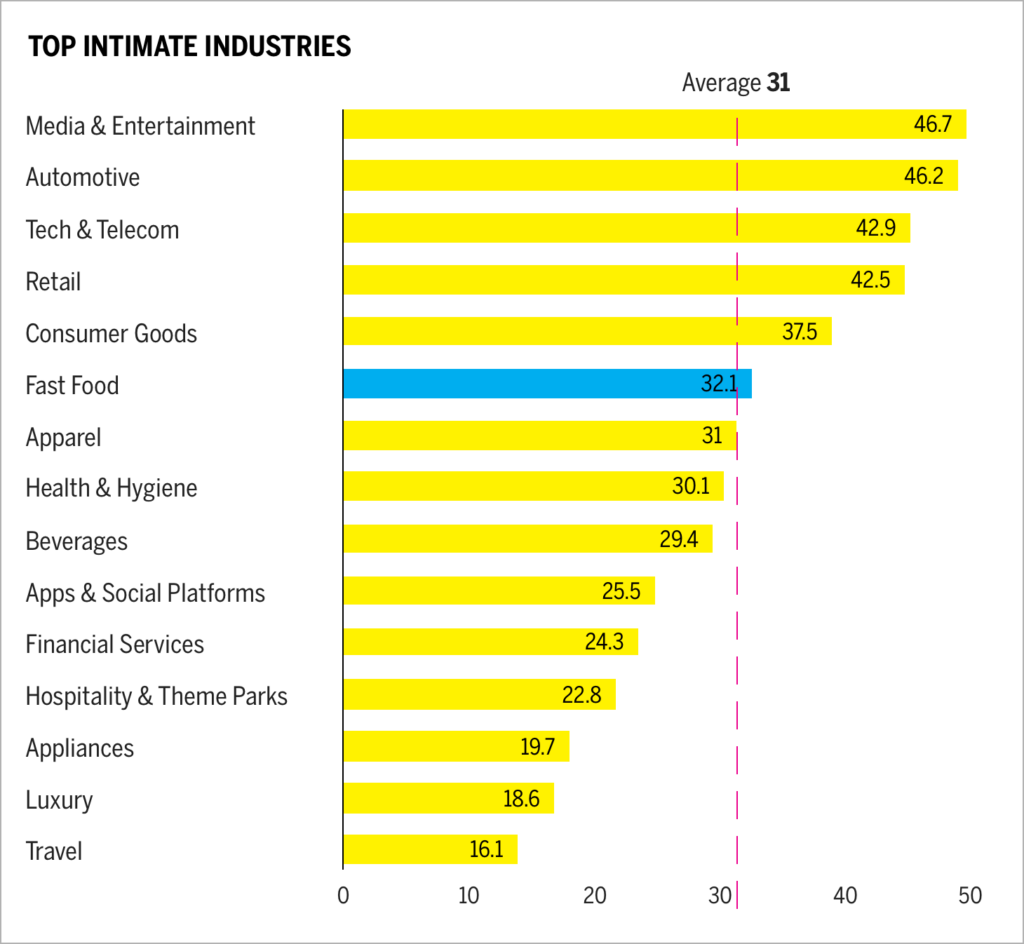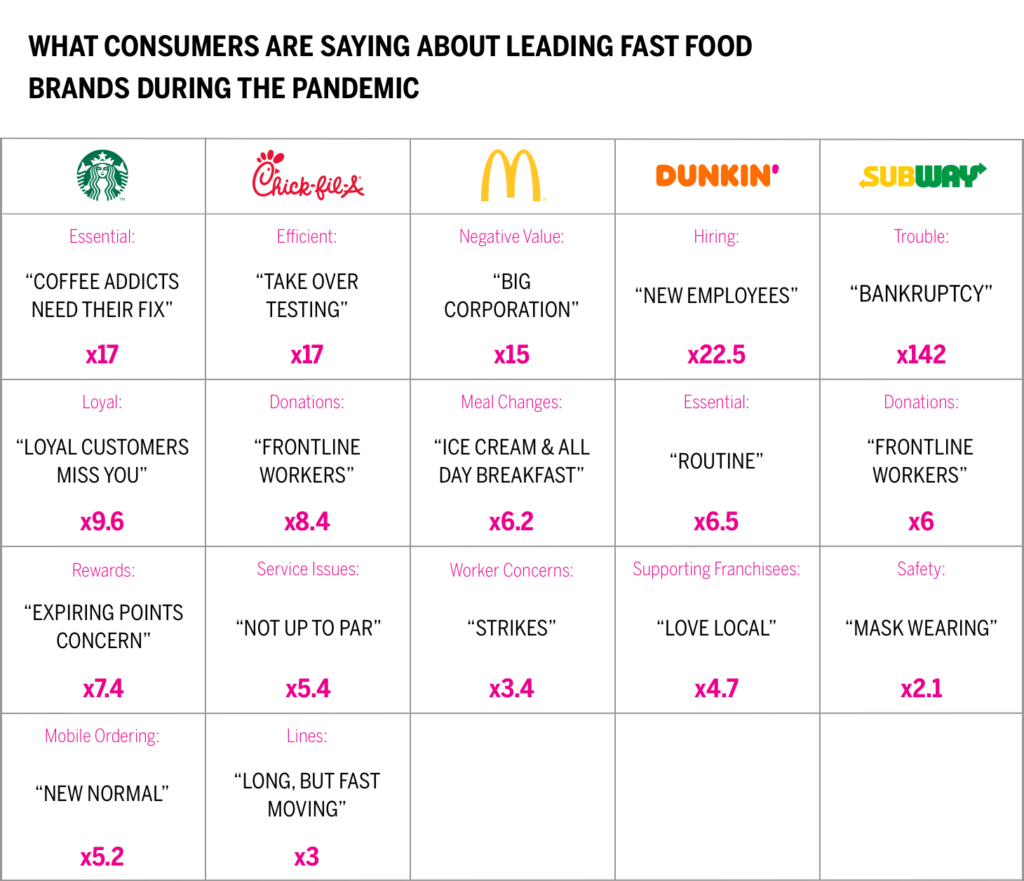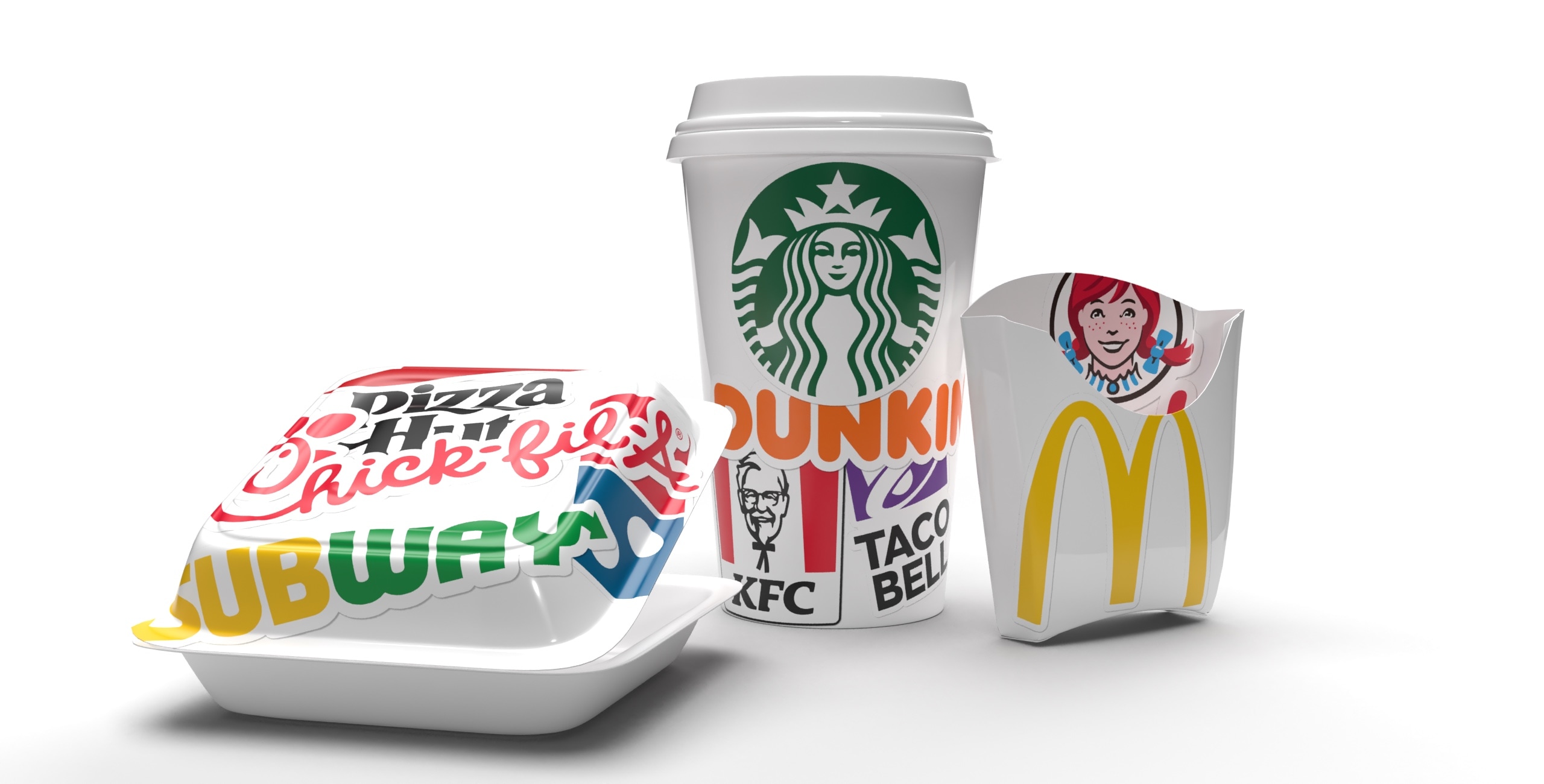Overview:
- The fast food industry ranks 6th out of 15 industries for building Brand Intimacy.
- Indulgence, associated with moments of pampering and gratification, is the most prominent archetype in the category.
- The industry also ranks 2nd out of 15 industries for indulgence.
- While companies speak about safety, consumers relate to top fast food brands differently.
As the world continues to struggle in the face of the COVID-19 pandemic, and businesses and their brands face unprecedented challenges, we are sharing our insights into how brands can refocus, enhance, or optimize for the marketplace we are eager to see return.
For context, our annual study of intimate brands, the largest of its kind, launched on Valentine’s Day 2020 with research fielded this fall. Because we are all facing a new COVID-19 affected-reality, we are offering highlights of brand performance both before and after the pandemic emerged.
Before the crisis, fast food brands, largely iconic and established, were maintaining the status quo while looking for new niche offerings to appeal to every palate (the Impossible burger) and diet (low-fat, keto, etc.). These brands have always done reasonably well in our Brand Intimacy Study, ranking 6th out of 15 industries for the several years.
With stay-at-home orders in place for many states over the past few months, we are separated from working, socializing, and living the lives we all were accustomed to. Although some fast food chains have been offering take out and delivery, we have not been able to dine out until recently. These brands, long associated with pleasure and convenience, continue to provide relief and are a growing source of comfort.
Category Performance

The fast food industry ranked 6th out of 15 industries.
For the fast food industry as a whole, indulgence is the dominant archetype. This means creating a close relationship centered around moments of pampering and gratification that can be occasional or frequent. This strength is increasingly relevant in today’s trying times when people are turning to what they find comforting.
Fast food brands also perform better than average in their ability to establish immediate emotional connections, at 46.1 percent compared to the 15-industry average of 38.5 percent. In addition, is that given the fact that many of these brands have been in business for decades, the fast food category ranks #3 (after consumer goods and beverages) in having the long-standing customers, who tend to stick around for ten years or more.
Pandemic Impact
The fast food industry has been severely affected by COVID-19, with many brands in significant decline due to initial closings and later because of a lack of in-store dining. NPC International Inc., the largest franchisee of Pizza Hut restaurants in the U.S., filed for bankruptcy after coronavirus-related shutdowns.1 Denny’s sales are down almost 50 percent, and the company announced it is selling stock to raise cash.2 Starbucks expects current-quarter operating income to plunge by up to $2.2 billion and sales to decline for the rest of the year.3 The company will also close up to 400 company-owned locations over the next 18 months while expanding “convenience-led formats” such as curbside pickup, drive-thru, and mobile-only pickup locations because of changing consumer behaviors due to the coronavirus.4 A few takeout-oriented businesses, such as Domino’s Pizza, have shown an increase in sales which are up about 26 percent year-to-date.5 Additionally, DailyPay has continued to monitor quick-service hiring trends in recent weeks. In its latest period—May 11 to June 14—it found a 28 percent increase in hiring. From May 11 to June 7, it was up 25 percent.6
Current Consumer Communications on Fast Food Brands
We’ve augmented our Brand Intimacy research (fielded in November 2019) with social listening research we’ve captured recently (the week ofJune 15). We studied the top 5 ranking fast food brands (Starbucks, Chick-fil-A, McDonalds, Dunkin’, and Subway) regarding communications on their websites related to COVID-19 and more significantly, inbound social conversations on Twitter. The analysis encompassed 561,094 words. We are able to see the number of appearances of key themes for each brand and the relative differences based on the other brands reviewed (e.g., Starbucks customers are 9.6 times more likely to talk about how much they miss the brand).
It is important to note that social listening data aren’t directly related to current Brand Intimacy measures. The emotional content of consumer posts (good and bad), how many comments align with existing Brand Intimacy archetypes, as well as link to Brand Intimacy stages as they express feelings of love, appreciation and longing are particularly notable in this review. We hypothesize that the sentiment captured and measured in this analysis will have an effect on future Brand Intimacy quotient scores and rankings.
Our topline findings:
All of the five brands reference COVID-19 on their website communications in different ways. Many, including Starbucks, Subway, and Chick-fil-A focus on employee hygiene and readiness to serve customers. McDonalds highlights its affordability and ability to help people enjoy a hot meal during the crisis. Dunkin’ talks more about appreciation for its customers, community, and essential workers.
Although the fast food brands speak in generally similar ways about their responses to COVID-19, is interesting to see how differently consumers speak about each brand in social media during the pandemic.

Different areas of focus among the top 5 brands.
Starbucks users demonstrate a great deal of emotion for the brand. From needing their fix and missing their favorite drinks to worrying about expiring points, the mentions are generally complimentary, friendly, and warm.
“I’ve missed going to @Starbucks so much, I’ve started spelling my name wrong on my cup for that authentic experience! #Quarantine #coffee #barista”
“@Starbucks I’m dying without my local barista!!! I haven’t even tried to recreate my drink yet but I know I gotta give it a shot!”
Interestingly, Starbucks is the only brand reviewed where increased adoption of the app and mobile ordering during the pandemic was mentioned. More consumers are using the Starbucks app as a way to maintain social distancing and contact-free pick ups. Overall, this further links Starbucks to the Brand Intimacy archetype of enhancement (making us better, smarter, and more connected through use of the brand) during this turbulent time. People are also complaining about their reward points expiring.
“New normal. Mobile ordering @Starbucks and waiting in yellow box.”
“@Starbucks got a notification that stars are set to expire on July 1…any chance of pushing this date out since many of us weren’t able to frequent your locations as often as before w/COVID?”
Chick-fil-A inspires a different kind of connection from its customers. People rave about the brand’s service and reliability. A few express disappointment in how the brand is adapting to COVID-19, but overall the brand is strongly linked to efficiency. This aligns with the Brand Intimacy archetype of fulfillment; exceeding expectations and delivering superior service, quality, and efficacy.
“I’m nominating @ChickfilA to be in charge of our nation’s drive through COVID-19 testing. It would be fast, friendly and probably delicious.”
“We could probably have the whole country tested for COVID by midnight if we let the Chick-fil-A crew run the drive through testing sites.”
Because service expectations are high for Chick-fil-A, a few customers are complaining about service issues. Others note long waits, although most appreciate the top notch organization.
“@ChickfilA has this pandemic thing down! Long line but made it through in less than 10 mins #eatmorechicken #WeAreAllInThisTogether #Covid_19”
“First time at @ChickfilA during Covid and very disappointed in the level of service compared to what I am used to at Chick Fil A. Would have thought their game would have been stepped up big time, instead it was rude employees.”
People appreciate the brand’s donations during the pandemic and also how its communities are also supporting frontline workers by donating Chick-fil-A meals. aIn addition to emphasizing the brand’s philanthropy, this links to identity, reflecting Chick-fil-A’s admired values and beliefs, which resonate deeply with its customers.
“Chick-Fil-YAY! @ChickfilA surprised Queen of the Valley Hospital donated 65 meals to the Emergency Department. Gestures like this make such a difference so that we can fight COVID-19. #strongertogether #heroesworkhere #ChickfilA #ThankfulThursday”
“The Nashville Predators hockey team donated 600 Chick-fil-A meals to feed Vanderbilt Children’s Hospital employees during the COVID-19 pandemic.”
“WOW! Chick-fil-A to donate over $10M to first responders impacted by COVID-19 pandemic”
Unfortunately, McDonald’s doesn’t engender the same emotional and positive posts that Starbucks and Chick-fil-A enjoy. It is seen as a big corporation that only cares about profit, not about protecting its employees.
“I’m praying day and night so my kids and I don’t get infected. We shouldn’t live in constant fear because corporations like @McDonalds won’t #ProtectAllWorkers.”
“You know times are tough when the local @McDonalds staff goes on #Covid_19 strike. They need the proper protection gear …”
“We’re back at @McDonalds on DAY 3 of our strike because after our co-worker was diagnosed positive for #Covid_19. We STILL haven’t been given two weeks paid leave to self quarantine. #Protectallworkers”
McDonalds’ customers also have more practical concerns. They are annoyed that the all-day breakfast is not an option during the coronavirus outbreak and complain that the ice cream machines are always broken.
“So quarantine for some reason means @McDonalds stops serving breakfast all day? That’s weak as hell.”
“MCDONALDS IS NO LONGER SERVING BREAKFAST ALL DAY! COVID-19 can wipe me out, I have no reason to live.”
“During this quarantine, @McDonalds should fix ALL their ice cream machine. @Wendys machine always a works.”
Dunkin’ has an interesting array of mentions. People are talking about the brand actively hiring, its COVID-19 routines and maintained devotion to Dunkin’ and appreciation of local franchisees.
Given the economic challenges in the country, the fact that Dunkin’ is hiring during COVID-19 has caught consumers’ attention, albeit with some questioning the hourly rate.
“Dunkin’ announced it was hiring up to 25, 000 workers due to the COVID-19 pandemic.”
“@dunkindonuts So you’re hiring. Do any of the jobs pay a living wage #LivingWage”
Many people have shared their devotion to the Dunkin’ brand and how it is part of their COVID-19 routine. This links to the Brand Intimacy archetype of ritual, when a person ingrains a brand into his or her daily actions.
“I literally cannot live without my Dunkin coffee. I’ve had one everyday since this quarantine lmao”
“Quarantine has me going to Dunkin every morning or iced coffee and a chocolate chip muffin.”
“New quarantine routine: Dunkin’ twice a day and Rain on Me on repeat.”
Many consumers feel a connection to their local franchisees and want to support them specifically as opposed to the corporation.
“I hope the Dunkin near me is a franchise cause it’s the only place I’ve spent all my money at during this whole quarantine.”
“I hope my local Dunkin is a franchise because I’ve personally been keeping them alive throughout COVID-19.”
Subway has a mixed bag of consumer mentions. The primary association is that it is in financial trouble. However, the brand’s donations to medical workers are being highlighted. Concern about how safe the restaurants are in light of COVID-19 is also being discussed, angering some.
“So apparently @SUBWAY is kind of trouble (not because of COVID, but-xx I’m sure it’s not helping), so I ordered some.”
“@SUBWAY franchisees are among the groups that filed for Chapter 11 bankruptcy in recent weeks…”
Consumers are celebrating how the brand and community donations are supporting frontline workers.
“The Frontlines Friday! Today we’re partnering with @SUBWAY to feed our healthcare workers fighting COVID-19 day after day”
“Someone bought us @SUBWAY for dinner in the COVID1-9 ER tonight, which was such a morale booster.”
Safety is also a key topic on social media. Customers have complained of Subway workers who don’t seem to be following safety restrictions as well as customers who are not showing any concern for the safety of others (e.g., not wearing masks, not practicing social distancing, etc.).
“@SUBWAY I went to your fast food restaurant this afternoon and nobody was wearing masks. I am disgusted!! They were talking over the food and with the COVID outbreak going on it is unacceptable!”
“@SUBWAY if you don’t want to keep losing more business make face masks and gloves required for all employees at all times during food handling.”
“Is COVID gone for good? Do we have a cure or a vaccine? I’m at @SUBWAY at 5010 Barret Pkwy to get some food. Server and Customer are talking, less than 3 ft from each other, no mask on server, no mask on customer. I’ll pass and go home.”
Recap:
Consumers are sharing their COVID-19-related feelings about fast food brands. Starbucks customers highlight how much they miss and appreciate the brand and their favorite drink. They don’t want to lose their reward points, and more people are using the app to maintain contactless pickups. The brand is loved, enhancing, and has escaped most of the negative reactions that other large corporate brands have seen. Chick-fil-A’s operational efficiency is held in high regard and service, although spotty, is believed to be as under control. The brand inspires confidence. McDonald’s is seeing more negative communications. Many view it as a big corporation that is more interested in profits than worker safety. Additionally, customers are frustrated over limited menus. Dunkin’ has its devotees, who make a Dunkin’ run part of their COVID-19 daily routine and who may feel a connection to their local franchisees as opposed to the corporation as a whole. Subway’s financial troubles are a prominent concern. Although the brand is recognized for its support of frontline workers, some express concern over lack of proper protocols in place during the pandemic.
Conclusion: Reliable Comfort
Fast food establishments have seen mixed results during the COVID-19. Many restaurants were closed for extended periods. Many have now reopened in modified form; however, indoor dining is still greatly reduced. The delivery business has increased for some, while bankruptcy is looming for others. Consumers have turned to fast food for comfort and calm, for easy prepared meals, and for providing a sense of normalcy and routine. There was pining while restaurants were closed, however, since these brands have started reopening, consumers have continued to express their love, appreciation, and criticisms. These brands have become essential to us as we head back to work and need lunch or return home rafter a long day ready to binge watch our favorite series while enjoying our favorite meal. For some, picking up dinner for their family harkens back to more normal times; for others, the need for comfort finds relief in a burger and fries.
As states begin to reopen at varying degrees, it will be interesting to see how our relationships with these brands change. Will we get used to what fast food dining has become in this pandemic age? Will consumers yearn for the fast food dining of the past? Will the need to order ahead affect the role technology plays in how we interact with the brands? Will their ability to provide us comfort and routine see us through this crisis, creating more frequent usage and more powerful bonds? It seems likely that consumers will remember and continue to deepen their emotional attachments to the brands in this space as they continue to evolve their offerings and provide the indulgence many crave.
Read our detailed methodology here, and review the sources cited in this article here.
Check out our annual study and rankings of intimate brands. Visit our most recent rankings of intimate famous figures, BFF. Our Amazon best-selling book is available at all your favorite booksellers. Additionally, MBLM offers Custom Dashboards, providing extensive data for brands included in our annual Brand Intimacy Study. To learn more about our Agency, Lab, and Platform, visit mblm.com.
